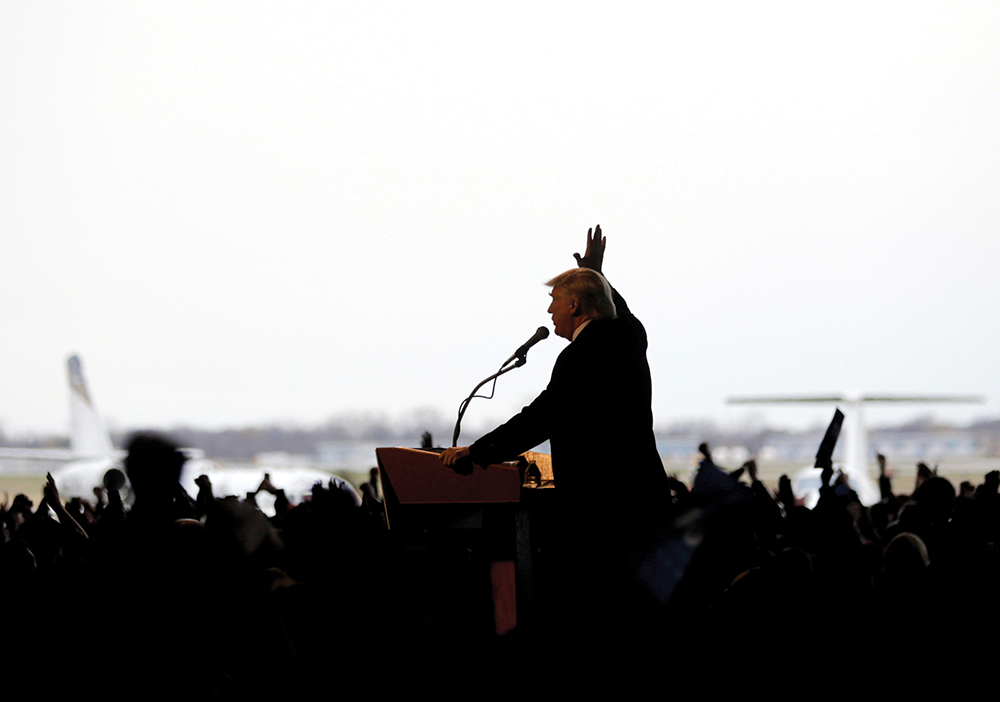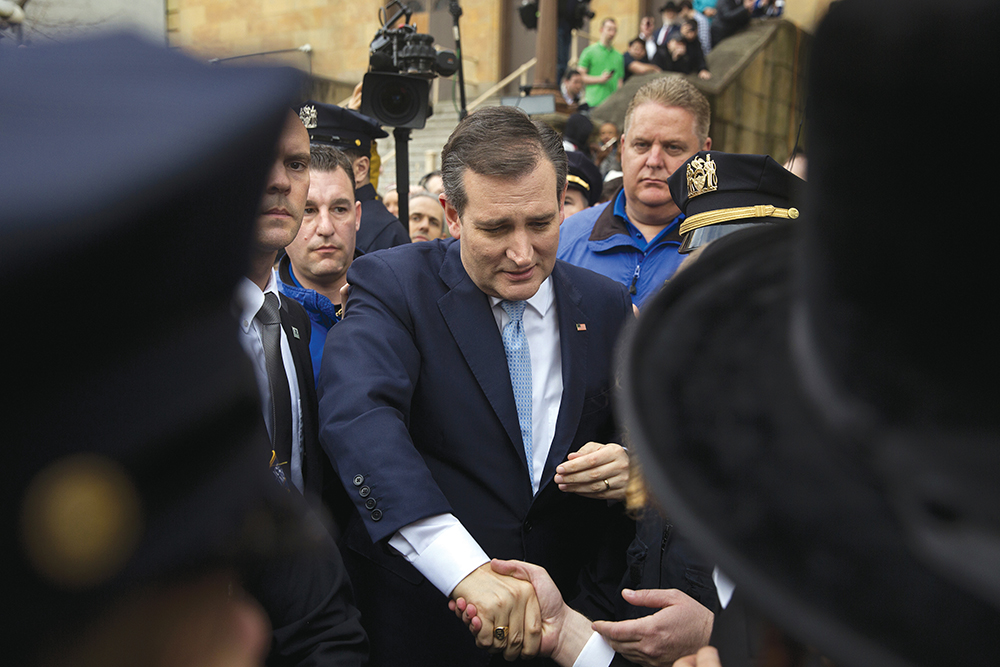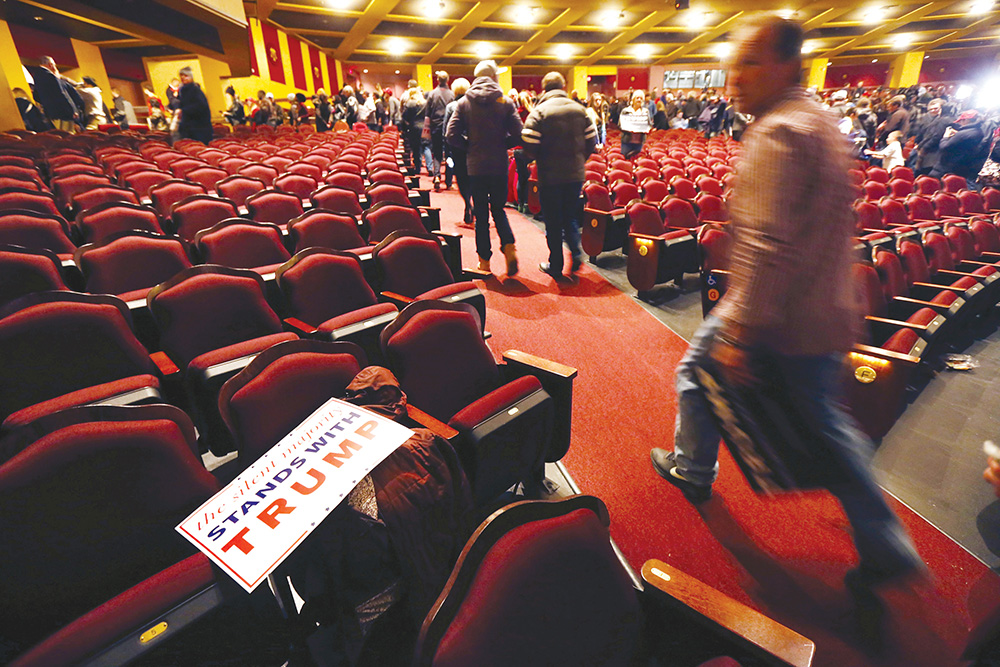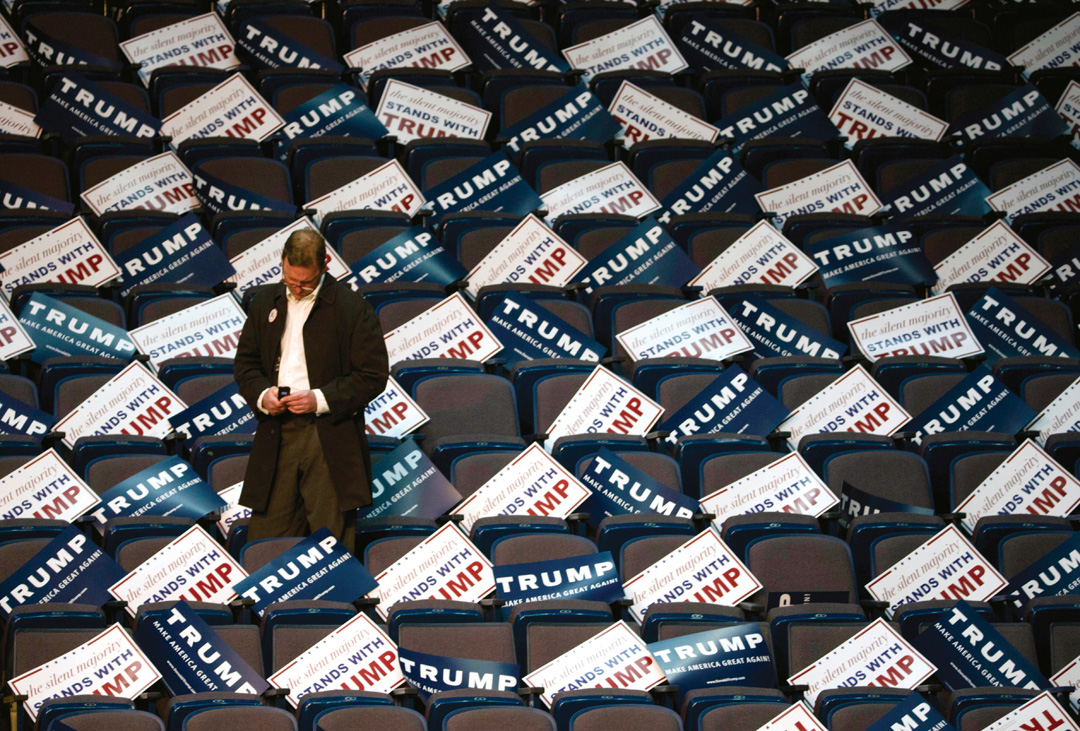After the first sustained rough patch of his presidential campaign, Donald Trump is headed home. The Republican front-runner enjoys home field advantage in New York on Tuesday, the biggest delegate prize in a series of Northeastern primaries that could help wipe away the memory of his Wisconsin defeat.
“Ted Cruz wanted Wisconsin to change the narrative of the race into a referendum on Donald Trump,” said Republican strategist Ford O’Connell. The Northeast primaries, with five states voting on April 26, give Trump an opportunity to turn it back into “a referendum on the establishment,” playing to his advantages.
Except for the Maine caucus, the Northeast has been Trump country. His first 2016 win was in New Hampshire. Prior to the New York primary, his biggest share of the vote was won in Massachusetts. If the boisterous billionaire has bumped up against the sensibilities of “Midwestern nice,” he has been a much better cultural fit in the New York-Boston corridor.
The calendar flips to the Northeast at a good time for Trump. He has had a difficult few weeks. His tweets about Heidi Cruz, his main primary opponent’s wife, have mobilized women and many conservatives against him. His comments about punishing women who seek illegal abortions after a Roe v. Wade reversal were condemned by both sides.

If the boisterous billionaire has bumped up against the sensibilities of “Midwestern nice,” he has been a much better cultural fit in the New York-Boston corridor. (AP Photo)
The cities are fast and loud. The suburbs are filled with people who have watched Trump’s reality TV shows. The blue-collar areas have been responsive to his populist pitch. Earlier, he had big rallies in Worcester and Lowell, Mass. Now he can go to Buffalo and Rome. Trump has been ubiquitous in the region for decades.
Many Republican voters here are moderate and not especially animated by social issues. The conservatives tend to be more blue-collar. Many of the region’s current and former Republican elected officials — New Jersey Gov. Chris Christie, former New York City Mayor Rudy Giuliani, Maine Gov. Paul LePage, New York Rep. Peter King — are brusque and in varying degrees share Trump’s disdain for political correctness.
Christie, who has a tight lock on New Jersey’s delegates, has endorsed Trump. Giuliani has stopped short of an endorsement, but publicly said he was voting for him. Both men are longtime friends of the billionaire.
In New York, Trump’s poll numbers range from 50-60 percent of the vote, his first outright majority of the primary campaign. One week after that contest, he’ll compete in Connecticut, Delaware, Maryland, Pennsylvania and Rhode Island.
He’s up nearly 16 points in Pennsylvania and Maryland, according to the RealClearPolitics average. He’s beating Cruz and John Kasich combined in Connecticut, an Emerson College poll found.
One Maryland poll found Kasich leading slightly among college-educated Republican primary voters. But Trump’s overwhelming advantage with non-college whites, a demographic on which he is pinning his 2016 hopes, easily wipes that out.
Ted’s troubles

Cruzdecided to write off the Northeast both in the primaries and the general election, so he thought he could use the region’s reputation for liberalism as a way to hit Trump. (AP Photo)
As friendly as the region is to Trump, it is hostile to Cruz. “It would be bad for Cruz if he comes in behind Kasich, as some polling suggests,” said Republican strategist Mike DuHaime, a former senior adviser to Christie’s presidential campaign. He added that Kasich could do well in these primaries, but is hurt by the perception he can’t win.
“Cruz has brought this on himself” with his attacks on “New York values,” DuHaime said. The Texas senator decided to write off the Northeast both in the primaries and the general election, so he thought he could use the region’s reputation for liberalism as a way to hit Trump. Now that he is in a fight for delegates where every little bit counts, it could hurt him and stall his recent momentum.
New York has 95 delegates at stake, Pennsylvania 71. The rest of the area states voting in April have 101 combined.
These Northeastern states have fewer evangelicals or Mormons than the contests Cruz has won in the past. Kasich has greater appeal to the moderate Republicans put off by Trump’s rhetoric. He previously came in a distant second in both Massachusetts and Vermont.
The Ohio governor failed to submit a slate of full delegates in Maryland, and has been weighed down by his failure to win anywhere besides his home. Republicans and crossover voters engaged in strategic anti-Trump voting have shied away from Kasich, who has dipped from second place in Pennsylvania to third in the statewide polling average.
But even with centrist anti-Trump sentiment, Cruz is a poor fit for these voters and even some of the GOP elected officials. The Texas Tea Party lawmaker would really put #NeverTrump to the test. He has regularly trailed Trump among moderate to liberal Republicans throughout the country. Republican businessman Chris Hackett told USA Today, “The harder they try to stop Trump, the more likely he is to succeed.”

Trump has drawn a mass audience with his celebrity and skilled use of earned media, fostering an emotional connection with them at large rallies, which has allowed him to mostly ignore traditional campaign staples like advertising, retail politics and delegate-gathering. (AP Photo)
Trump’s abortion comments and other stumbles aside, the bigger story has been Trump’s organizational incompetence. He has watched Cruz capture delegates at state Republican conventions and caucuses, even getting some of his own supporters into delegate slots won by Trump
His campaign has given inaccurate information to supporters about delegate slates and paperwork deadlines, once sending instructions for Washington state delegates to D.C. residents.
Both campaigns have been leveraging their comparative advantages. Cruz is disciplined, tightly organized and has experienced staffers and grassroots supporters with sharp attention for detail.
Trump has drawn a mass audience with his celebrity and skilled use of earned media, fostering an emotional connection with them at large rallies, which has allowed him to mostly ignore traditional campaign staples like advertising, retail politics and delegate-gathering.
“He’s been cheap,” said O’Connell, who pointed out that Trump even brags about how little he spends relative to other, less successful Republican campaigns. “It’s like having a star quarterback with no offensive line.”
These approaches have paid off for both candidates, but now Trump faces an uncertain path to a 1,237-delegate majority and would be at a disadvantage beyond the first ballot at the convention. The delegates that have been left on the table could make the difference between whether Trump wins the nomination or goes home from Cleveland empty-handed.
Trump has responded by cultivating his supporters’ grievances and perception that the party establishment is rigging the contest against them, even disenfranchising them. “The party is playing dirty,” Trump bellowed in Albany. “The RNC should be ashamed of themselves for allowing this kind of crap to happen.”
This keeps his voters’ enthusiasm up even in the face of losses, but angers backers of other candidates and even drew a rare rebuke from Republican National Committee Chairman Reince Preibus.

In New York, Trump’s poll numbers range from 50-60 percent of the vote, his first outright majority of the primary campaign. One week after that contest, he’ll compete in Connecticut, Delaware, Maryland, Pennsylvania and Rhode Island. (AP Photo)
Preibus noted on Twitter, Trump’s favorite social media site, that the nomination process rules have been in place for over a year. “It’s the responsibility of campaigns to understand it,” he said. “Complaints now? Give us all a break.”
A series of Northeastern primary successes could buy Trump time to retool his organization, and perhaps even create enough momentum to make such improvements unnecessary. The renewed momentum could also undercut Cruz’s argument that his comfortable Wisconsin win reflected a fundamental transformation of the race, the unraveling of Trump.
“Trump needs to run through New York, Connecticut, Delaware, Maryland, Pennsylvania and Rhode Island like Gen. Sherman through the South,” said O’Connell, noting that in May many of the states that will be voting once again favor Cruz. “He needs to win as convincingly as possible.”
Heading into May
Republicans are skeptical that even a slew of Northeastern landslides will dramatically affect how other regions vote, since that hasn’t been the case in the campaign so far. Most of Pennsylvania’s delegates, for example, would still remain unbound. But demonstrating he can repeatedly win more than the 37 percent of the vote he has claimed in the primaries up to this point could rebuild his aura of inevitability.
While Trump is considered the most anti-establishment candidate in the Republican race, the profile of the states he has won already and where he is favored going forward resembles the path followed by establishment hopefuls in the past.
Trump lost Iowa but won New Hampshire. He won South Carolina, the old establishment firewall that rescued George H.W. Bush in 1988 and George W. Bush in 2000, but buried Jeb Bush this year. He managed to beat an underperforming Christian right candidate in the Bible belt while dominating Northeastern states that were once assumed likely to help someone like Bush, Christie, Kasich or Marco Rubio clinch.

While Trump is considered the most anti-establishment candidate in the Republican race, the profile of the states he has won already and where he is favored going forward resembles the path followed by establishment hopefuls in the past. (AP Photo)
Cruz hasn’t done as well as expected in the South. But his wins in caucuses like Iowa’s and state conventions where the ideologically committed are most likely to show up is what you would expect for a candidate backed by grassroots conservatives. His difficulty gaining traction in the Northeast was also easy to predict, but the assumption would have been that he’d be beaten by an establishment candidate there.
“Trump has won most of the states, like the front-runner for the nomination usually does,” DuHaime said. “Cruz has won a lot of the Santorum-Huckabee states, though he is a stronger candidate than either of them.”
The businessman’s homecoming hasn’t been entirely without incident. Hillary Clinton has already sidestepped Bernie Sanders and run ads against Trump in New York. She has targeted Spanish speakers and argued that Trump’s rhetoric is too divisive to reflect the state’s diversity.
One ad contrasts Trump “calling immigrants criminals and rapists” with Clinton’s record of registering immigrants to vote and pushing for expanded healthcare. Trump would likely suggest that this means Clinton is afraid he would put New York in play in November. A more plausible explanation is that it could increase minority turnout, her key to beating Sanders in the primary.
But that doesn’t put a damper on things for Trump. “We will beat her so bad,” he said of Clinton at a Rome, N.Y., rally. First, he must deal with his Republican opponents. He has no doubts about how that is going to end.
“We’re going to win,” Trump told the crowd, “and we’re going to win so big.”
